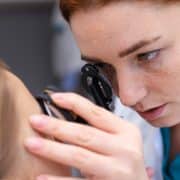The Unfiltered Truth About Aging Eyesight
As you age, many new health concerns can arise. However, seeking a comprehensive eye exam in Brunswick, GA, is just as important as scheduling a visit to the doctor for a physical checkup. Age does affect your vision and visual health, but this is nothing to fear with a good relationship with your chosen optometrist. Take a look at a few things to know about eye health as you age below.
Presbyopia Demystified: What to Expect as You Age
Presbyopia is an age-related vision change that occurs when the eye’s lens loses flexibility, which in turn affects the ability to focus on close objects. This common condition becomes noticeable as you age, as reading or close work may become more challenging. Understanding presbyopia is crucial for those entering their later years. Therefore, learning about its symptoms and the need for reading glasses or contact lenses is a good idea.
Busting Myths About Declining Night Vision
Older eyes may take longer to adjust to the darkness, which can be to blame for affecting one’s ability to see clearly at night. However, not all people will struggle to see clearly at night as they age. In fact, some individuals may face more issues driving in the bright sunlight than the low light as they get older.
Coping Strategies for Age-Related Vision Changes
Coping with vision changes as you age involves adapting to evolving needs. You may need to discuss your needs with an optometrist and find optical solutions that can help with visual acuity in different circumstances. Follow good lighting practices in your typical environments, utilize magnifying aids for reading, and maintain regular eye checkups to support your eyes as they change. These strategies allow you to navigate and adapt to age-related vision changes for continued visual well-being.
Discuss Your Vision with a Brunswick Eye Doctor
Aging affects vision, but with a trusted Brunswick, GA optometrist, there’s no need to be concerned about your visual health future. Careful monitoring and routine discussions with your eye doctor can make all the difference. If you have concerns about your visual health as you age, be sure to reach out to the team at Vision Source to schedule an appointment.



